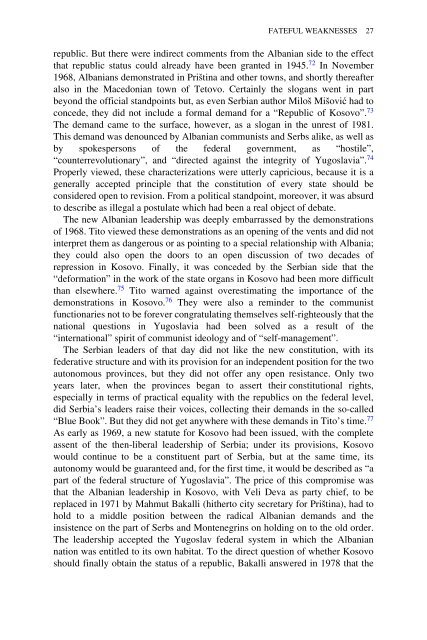Yugoslavia: A History of its Demise - Indymedia
Yugoslavia: A History of its Demise - Indymedia
Yugoslavia: A History of its Demise - Indymedia
You also want an ePaper? Increase the reach of your titles
YUMPU automatically turns print PDFs into web optimized ePapers that Google loves.
FATEFUL WEAKNESSES 27<br />
republic. But there were indirect comments from the Albanian side to the effect<br />
that republic status could already have been granted in 1945. 72 In November<br />
1968, Albanians demonstrated in Priština and other towns, and shortly thereafter<br />
also in the Macedonian town <strong>of</strong> Tetovo. Certainly the slogans went in part<br />
beyond the <strong>of</strong>ficial standpoints but, as even Serbian author Miloš Mišović had to<br />
concede, they did not include a formal demand for a “Republic <strong>of</strong> Kosovo”. 73<br />
The demand came to the surface, however, as a slogan in the unrest <strong>of</strong> 1981.<br />
This demand was denounced by Albanian communists and Serbs alike, as well as<br />
by spokespersons <strong>of</strong> the federal government, as “hostile”,<br />
“counterrevolutionary”, and “directed against the integrity <strong>of</strong> <strong>Yugoslavia</strong>”. 74<br />
Properly viewed, these characterizations were utterly capricious, because it is a<br />
generally accepted principle that the constitution <strong>of</strong> every state should be<br />
considered open to revision. From a political standpoint, moreover, it was absurd<br />
to describe as illegal a postulate which had been a real object <strong>of</strong> debate.<br />
The new Albanian leadership was deeply embarrassed by the demonstrations<br />
<strong>of</strong> 1968. Tito viewed these demonstrations as an opening <strong>of</strong> the vents and did not<br />
interpret them as dangerous or as pointing to a special relationship with Albania;<br />
they could also open the doors to an open discussion <strong>of</strong> two decades <strong>of</strong><br />
repression in Kosovo. Finally, it was conceded by the Serbian side that the<br />
“deformation” in the work <strong>of</strong> the state organs in Kosovo had been more difficult<br />
than elsewhere. 75 Tito warned against overestimating the importance <strong>of</strong> the<br />
demonstrations in Kosovo. 76 They were also a reminder to the communist<br />
functionaries not to be forever congratulating themselves self-righteously that the<br />
national questions in <strong>Yugoslavia</strong> had been solved as a result <strong>of</strong> the<br />
“international” spirit <strong>of</strong> communist ideology and <strong>of</strong> “self-management”.<br />
The Serbian leaders <strong>of</strong> that day did not like the new constitution, with <strong>its</strong><br />
federative structure and with <strong>its</strong> provision for an independent position for the two<br />
autonomous provinces, but they did not <strong>of</strong>fer any open resistance. Only two<br />
years later, when the provinces began to assert their constitutional rights,<br />
especially in terms <strong>of</strong> practical equality with the republics on the federal level,<br />
did Serbia’s leaders raise their voices, collecting their demands in the so-called<br />
“Blue Book”. But they did not get anywhere with these demands in Tito’s time. 77<br />
As early as 1969, a new statute for Kosovo had been issued, with the complete<br />
assent <strong>of</strong> the then-liberal leadership <strong>of</strong> Serbia; under <strong>its</strong> provisions, Kosovo<br />
would continue to be a constituent part <strong>of</strong> Serbia, but at the same time, <strong>its</strong><br />
autonomy would be guaranteed and, for the first time, it would be described as “a<br />
part <strong>of</strong> the federal structure <strong>of</strong> <strong>Yugoslavia</strong>”. The price <strong>of</strong> this compromise was<br />
that the Albanian leadership in Kosovo, with Veli Deva as party chief, to be<br />
replaced in 1971 by Mahmut Bakalli (hitherto city secretary for Priština), had to<br />
hold to a middle position between the radical Albanian demands and the<br />
insistence on the part <strong>of</strong> Serbs and Montenegrins on holding on to the old order.<br />
The leadership accepted the Yugoslav federal system in which the Albanian<br />
nation was entitled to <strong>its</strong> own habitat. To the direct question <strong>of</strong> whether Kosovo<br />
should finally obtain the status <strong>of</strong> a republic, Bakalli answered in 1978 that the
















